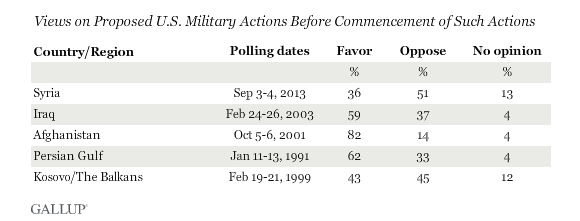In fact, U.S. support for interventionism abroad in places like Kosovo, the Persian Gulf, Afghanistan, and Iraq all garnered more backing from Americans than the proposed military strikes against Syria currently being debated in Washington and across the country. But the question is: Are the People’s Representatives listening?
Americans' support for the United States' taking military action against the Syrian government for its suspected use of chemical weapons is on track to be among the lowest for any intervention Gallup has asked about in the last 20 years. Thirty-six percent of Americans favor the U.S. taking military action in order to reduce Syria's ability to use chemical weapons. The majority -- 51% -- oppose such action, while 13% are unsure.
Public opinion, of course, isn't the only reason not to launch military air strikes against the Assad regime (and there are some valid arguments for why we should). But here are a few of my concerns: First, what does the United States hope to accomplish in Syria? Obviously Washington wants to bring some semblance of stability to the region -- and prevent Assad from using chemical weapons again on his own people. Fair enough. However, as Guy previously noted, a bombing campaign against Assad’s government would undoubtedly help the Syrian rebels. Question: Is this a wise decision given some of the rebel leaders’ reputation for lawlessness and barbarism? There are no doubt elements of the (crumbling?) opposition that are pro-western -- but some are clearly sworn enemies of the United States. So are we really comfortable taking sides? On the other hand, if the end-game is regime change -- as Secretary Kerry seems to suggest -- how on earth can we accomplish this without committing endless supplies of resources to the region and eventually putting boots-on-the-ground? Isn’t the phenomenon known as “mission creep” inevitable if that’s the stated goal? Air strikes aren’t going to cut it, after all. And by the way, what if the new regime that comes to power after Assad’s downfall is even more lawless and evil than the previous government? Recent history shows us that this does happen. What do we do then?
Second, how are we going to pay for all of this? I realize I sound like a broken record but Mark Steyn is correct when he notes dryly that the United States of America is the “Brokest Nation in History.” So how will we finance yet another war when we’re already spending one trillion more dollars every year than we take in? We can’t keep this up indefinitely.
And finally, as noted above, the public stands firmly against intervention. Yes, the United States’ reputation and credibility is on the line (thanks in part to the president’s “red-line” proclamation) but the Commander-in-Chief and members of Congress work for us, remember? Shouldn’t the American people’s opinions at least count for something?
Recommended
There are no easy answers here. But, at the very least, there are things to consider and weigh before we march headlong into a bombing campaign against Syria. And while this might not be war in the “classic” sense, it’s war nonetheless. And America would do well to tread carefully.



